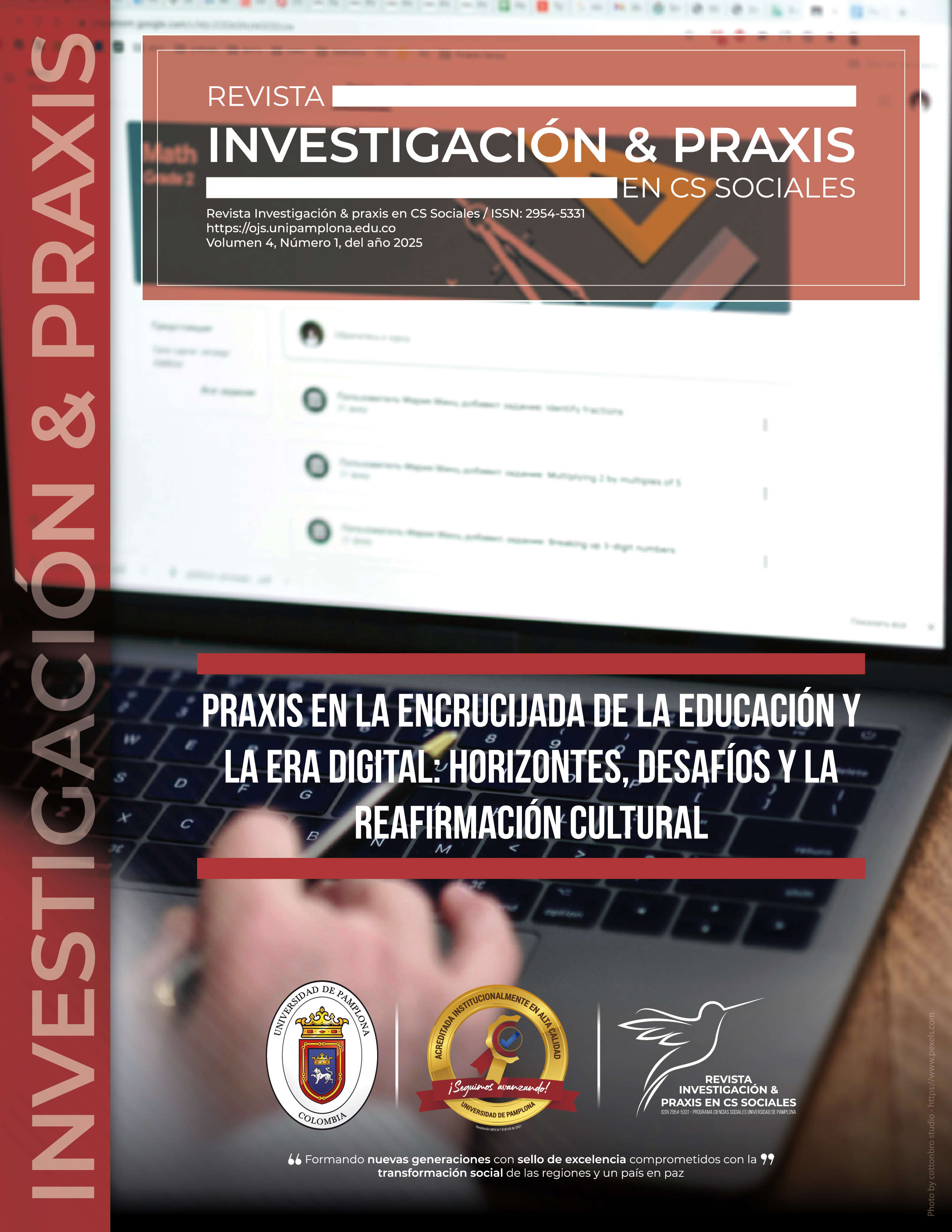Weaving pedagogical identity: voices and experiences of first- semester students at the university of Pamplona (Colombia)
DOI:
https://doi.org/10.24054/ripcs.v4i1.4016Keywords:
Professional identity, pedagogy, qualitative case study, ethnography, humanized approach, teacher educationAbstract
Building Professional Identity in Pedagogy: A Study at the University of Pamplona
This qualitative ethnographic study explored how nine first-semester students (2024) at the University of Pamplona (Colombia) construct their professional identity in pedagogy. The descriptive research aimed to understand their initial perceptions, expectations, and challenges on the path to teaching, within the institution's cultural and academic environment.
Detailed narratives and observations were collected through semi-structured interviews, field diaries, and participant observation. The findings indicate that the emerging professional identity is influenced by prior experiences, intrinsic motivations, and immersion in the university culture. Vocation, empathy, and the desire to transform emerged as fundamental pillars, shaped by the expectations of the environment.
The study concludes that educational institutions should foster critical reflection and the development of a teaching identity rooted in humanist and ethical principles, validating individual trajectories and strengthening a sense of belonging from the beginning of their training.
References
Bandura, A. (1997). Self-efficacy: The exercise of control. W. H. Freeman and Company.
Beijaard, D., Meijer, P. C., & Verloop, N. (2004). Reconsidering research on teachers’ professional identity. Teaching and Teacher Education, 20(2), 107-128.
Bogdan, R. C., & Biklen, S. K. (2007). Qualitative research for education: An introduction to theories and methods (5th ed.). Pearson.
Braun, V., & Clarke, V. (2006). Using thematic analysis in psychology. Qualitative Research in Psychology, 3(2), 77-101.
Connelly, F. M., & Clandinin, D. J. (1999). Historias de experiencia e indagación narrativa. En
F. M. Connelly & D. J. Clandinin (Eds.), Formando una identidad profesional: Historias de la práctica educativa (pp. 3-14). Teachers College Press.
Creswell, J. W., & Poth, C. N. (2018). Indagación cualitativa y diseño de investigación: Elección entre cinco enfoques (4ta ed.). Sage Publications.
Day, C., Kington, A., Stobart, G., & Sammons, P. (2006). Las vidas personales y profesionales de los docentes: Puntos de vista de un estudio cualitativo. Research Papers in Education, 21(2), 263-294.
Denzin, N. K., & Lincoln, Y. S. (2005). El manual SAGE de investigación cualitativa (3ra ed.). Sage Publications.
Emerson, R. M., Fretz, R. I., & Shaw, L. L. (2011). Escribiendo notas de campo etnográficas
(2da ed.). University of Chicago Press.
Finlay, L. (2002). Negociando el pantano: La oportunidad y el desafío de la reflexividad en la práctica investigadora. Qualitative Research, 2(2), 209-230.
Flores, M. A., & Day, C. (2006). Contextos que dan forma y son formados por el profesionalismo e identidad de los docentes. Teaching and Teacher Education, 22(8), 1079- 1081.
Gee, J. P. (2000). La identidad como lente analítica para la investigación en educación.
Review of Research in Education, 25, 99-125.
Geertz, C. (1973). La interpretación de las culturas: Ensayos seleccionados. Basic Books.
Hsieh, H. F., & Shannon, S. E. (2005). Tres enfoques para el análisis de contenido cualitativo.
Qualitative Health Research, 15(9), 1277-1288.
Kvale, S., & Brinkmann, S. (2009). InterViews: Aprendiendo el arte de la entrevista de investigación cualitativa (2da ed.). Sage Publications.
Lortie, D. C. (1975). Maestro de escuela: Un estudio sociológico. University of Chicago Press.
Mertens, D. M. (2010). Investigación y evaluación en educación y psicología: Integrando la diversidad con métodos cuantitativos, cualitativos y mixtos (3ra ed.). Sage Publications.
Noddings, N. (1984). Cuidar: Un enfoque femenino de la ética y la educación moral. University of California Press.
Patton, M. Q. (2015). Métodos de investigación y evaluación cualitativos: Integrando teoría y práctica (4ta ed.). Sage Publications.
Rogers, C. R. (1969). Libertad para aprender. Charles E. Merrill Publishing Company. Shulman, L. S. (1987). Conocimiento y enseñanza: Fundamentos de la nueva reforma.
Harvard Educational Review, 57(1), 1-22.
Spradley, J. P. (1980). Observación participante. Holt, Rinehart and Winston.
Wenger, E. (1998). Comunidades de práctica: Aprendizaje, significado e identidad. Cambridge University Press.
Yin, R. K. (2018). Investigación de estudio de caso y aplicaciones: Diseño y métodos (6ta ed.). Sage Publications.
Published
How to Cite
Issue
Section
License
Copyright (c) 2025 Revista Investigación & praxis en CS Sociales

This work is licensed under a Creative Commons Attribution 4.0 International License.










